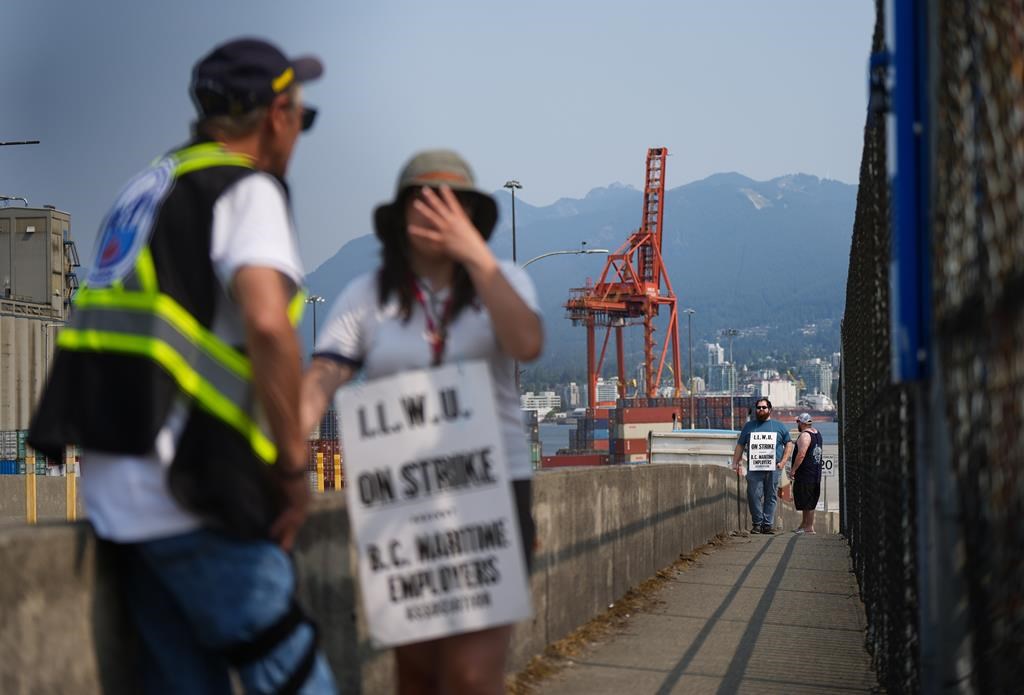Premier Scott Moe took to Twitter Wednesday after the B.C. port workers returned to the picket lines, saying Saskatchewan jobs and industries are at stake.

The strike that began on July 1 lasted 13 days before it resumed Thursday after the federal government reached a tentative deal with the B.C. Maritime Employers Association and the International Longshore and Warehouse Union Canada.
After work resumed, the Canadian Manufacturers and Exporters said in a statement that the trade sector is not “out of the woods yet,” as the damage to manufacturing supply chains is “significant.”
On Tuesday, the union representing the 7,400 workers ordered them back to the picket lines.
“The work stoppage at the Port of Vancouver has already had a devastating impact on Saskatchewan’s economy,” Moe tweeted Wednesday. “We simply cannot afford for this disruption to continue any longer. Saskatchewan jobs and export-based industries are at stake. While I was encouraged that the federal government had worked with the parties to end the previous work stoppage, it is now time to provide certainty and stop this new disruption immediately.”
A CME survey of its members between July 11 and 13 found that nearly two-thirds of Canadian manufacturers have already been severely impacted, and the strike has cost businesses an average of $207,000 per day.
The Vancouver trade board said on Thursday that 63,000 shipping containers are waiting on the water to be unloaded.
A tweet from Labour Minister Seamus O’Regan stated the resumption of the strike is illegal.
“The Canada Industrial Relations Board (CIRB) — an independent body created to keep industrial peace — this morning ruled that the ILWU Canada cease and desist from participating in any strike action because the union did not provide 72 hours notice. This strike is illegal,” read the tweet.
Moe agreed.
“It’s effectively an illegal blockade that’s preventing Canadian goods from getting to market, damaging our economy and killing jobs,” read Moe’s response to O’Regan’s tweet. “The federal government must act immediately to end this illegal blockade.”
“The federal government should recall Parliament as quickly as possible, and I would expect all parties to protect Canada’s economy and workers by allowing back to work legislation to pass without delay,” he added in another tweet.
Saskatchewan’s Minister of Highways Jeremy Cockrill said the news is incredibly disappointing.
“Estimates show that $22 billion of goods from Saskatchewan exporters and importers moved through the port of Vancouver just last year,” Cockrill said.
He noted that the province’s potash sector is already cutting operations.
Nutrien Ltd. curtailed production at its Cory potash mine last week after it lost export capacity.
Brad Sigurdson, vice-president of Saskatchewan’s Mining Association, told Global News last week they are already backed up and won’t see things return to normal until October.
“We are trying to get our fertilizer that the world needs to help feed the planet out to our markets internationally and we need to do that in order to meet their growing season,” Sigurdson said. “If we don’t, what that will result in is countries that may not see the yields that they need to see.”
About 95 per cent of the Saskatchewan Mining Association’s products travel through ports in B.C.
Cockrill mentioned Wednesday that the agricultural community will also begin to feel the impacts in the fall.
He also claimed the provincial government predicted the strike coming and was calling on the federal government to get involved in mid-June.
“We could see this coming and we could see the effect it is going to have on the Saskatchewan economy.”
— with files from Global News’ Saba Aziz




Comments